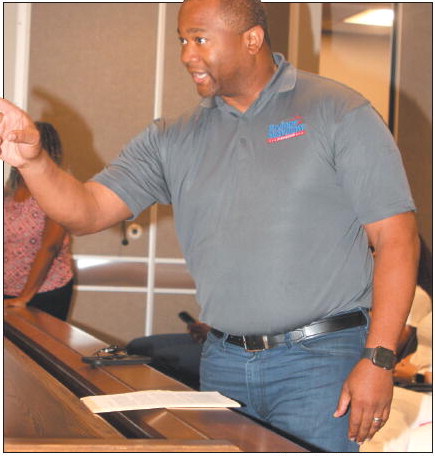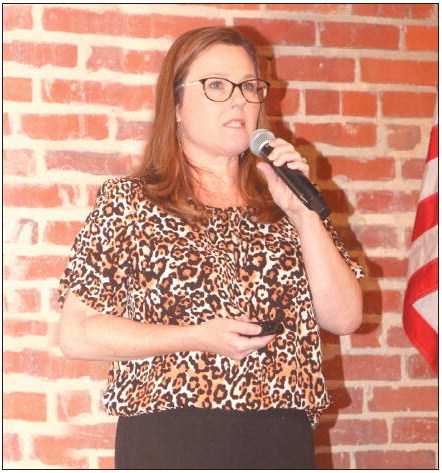Altamaha EMC Announces $29 Million Broadband Project
mrandolphadvance@gmail.com
Last week Altamaha EMC announced plans for a $29 million project that will supply 1500 miles of fiber optic cable to the Toombs County area.
The project will extend from Toombs County to East Dublin, and cover Montgomery County, as well as portions of Tattnall, Treutlen, and Laurens Counties. “We have chosen to invest in the latest technology, which can provide up to 10 gb/s, up and down as well as symmetrically,” said Altamaha EMC Contracted Engineer Phil Proctor.
During an invitation-only event Friday afternoon, the EMC detailed plans for its new Altamaha Fiber cooperative to provide broadband Internet to residential customers. Proctor informed the crowd that test customers began receiving services in July, making Altamaha EMC the first electric cooperative to provide customers with broadband south of North Georgia. Test customers live in very rural agricultural areas, with some located five miles south of Vidalia. According to Proctor, these test customers enjoy the best Internet speeds continued from page
available to residents in the state.
Base service for residential customers will be 1 gb/s, which most current technology cannot accomplish, but services up to 10 gb/s will be available to customers through various plans within Altamaha Fiber.
Proctor explained that L.G. Herndon Farms, Inc. in Toombs County was the location for the announcement on Friday because the farm had been the first business test customer for broadband services. “The lines coming into this building would allow owner Bo Herndon to live stream the Georgia Tech vs. Virginia Tech football game in vivid 4k resolution,” Proctor attested.
He explained that the partnership in this endeavor between Altamaha EMC and Toombs and Montgomery Counties allowed the cooperative to apply for an extra $10 million in funding through the American Rescue Plan Act of 2021 on behalf of these counties. Proctor has acted as what Altamaha EMC Marketing and Communications Manager Tammye Vaughn describes as “the guiding force for the broadband project.” Proctor explained he has attempted to bring this Internet service to the area for going on nine years, during which he has seen little success.
Proctor explained that it was the North Georgia EMC Cooperatives that inspired him to continue to work to develop this service option, as these EMCs used stimulus money to begin running broadband directly into the homes of their customers. He stated that a large challenge to overcome in this endeavor was the uneasiness regarding the use of fiber cables.
“Honestly, we were seeking cheaper options than fiber cables because we knew the service had to be able to sustain itself rather than merely clinging to the subsidization by the electric side of the business,” Proctor said.
It was the construction of some electric substations with fiber-optic cables and the advice of an Internet provider business that bridged the gap between the desire to accomplish this development and the accomplishment itself.
In 2019, Proctor stumbled upon information regarding the USDA Reconnect Program, which was a pathway to develop the service. After this discovery, Altamaha EMC sought continued from page
a 50/50 grant and loan and launched a feasibility study. The feasibility study concluded that with this grant and loan, Altamaha EMC could develop broadband and make it a sustainable business and service apart from the electric cooperative.
“It has taken a long time to develop the paperwork and planning as necessary for the grant and loan,” Proctor stated. “In that time, the Federal Communications Commission (FCC) developed funding for rural areas seeking to bring broadband to homes and businesses through the Rural Digital Opportunity Fund (RDOF); so we were able to gain that as well.”
Altamaha EMC representatives and state legislators attending the October 29 event echoed Proctor’s sentiments that the development has been a long time coming. Altamaha EMC Assistant Manager George McLendon said, “Since Senate Bill 2 was signed into law by Governor Brian Kemp back in 2019, Altamaha EMC has been planning for this day. We are finally answering the call to provide a solution for the broadband challenges in our rural area.” He continued, “This is truly a turning point in the history of Altamaha EMC. Back in 1936, Altamaha EMC was chartered because a group of forwardthinking citizens recognized the need for electric services to be extended to rural areas in Southeast Georgia. McLendon explained that Altamaha EMC’s Board of Directors and partners are faced with a challenge of providing broadband to those same rural areas as those who came before them sought to serve. He also stated that the COVID pandemic defined the divide between the rural areas and more urban areas where reliable high-speed Internet is available, making it crucial to develop a solution for this lack of connectivity.
“The growth and future of business in rural Georgia depends on access to dependable Internet services,” he concluded.
District 1 Georgia Public Service Commissioner Jason Shaw noted, “Broadband is the number one issue we face in rural America. The Public Service Commission is working on this broadband issue every day, just like everyone else, even though it is not something we regulate. It has given us the opportunity to work with so many of our friends around the state in the EMC world on something that is vital to our citizens in rural Georgia.”
Shaw referenced his personal ties to the broadband issue, explaining that living on a farm affected his children negatively when the pandemic arose because virtual learning was a struggle. “There is no reason that people like us in rural Georgia shouldn’t have the advantage that people in the towns and cities have with Internet. It’s not just economic development like it used to be. Now it’s so much more than that because it is a quality of life issue,” he told the attendees. “You have to have Internet to do anything these days.”
Shaw concluded, “Years from now we’ll be discussing how we wouldn’t be where we are today if the EMC had not done this.”
He added, “No matter the technology developed, there is nothing to replace fiber connectivity to move data and connect houses and businesses. This is cutting– edge technology, Internet as fast as possible, that will be right here, and it’s because of all the people that have taken risks and chances to provide their citizens with everything they can.”
Described as being a “friend and supporter of Altamaha EMC,” Georgia District 19 Senator Blake Tillery, R-Vidalia, addressed the attendees about the significance of broadband development in the history of the area.
“We are no longer planting trees whose shade we will never walk under; this service moves so fast, in the near future we will reap the benefits of these decisions. The reason leaders have worked so hard to accomplish this is because of the unified desire for the area.”
Concluding his remarks on the development of broadband for the area, Tillery explained that the future is still on the minds of all leaders involved in this decision. “Your leaders are not stopping at merely developing the service. They are already planning the future and the next phases and steps of this development.”
Altamaha EMC General Manager Romanous Dotson closed the announcement ceremony by sharing his gratitude to all involved with this development. “Thank you all for your help and support of Altamaha EMC, and we look forward to continuing to serve our area in the best ways we can.”





